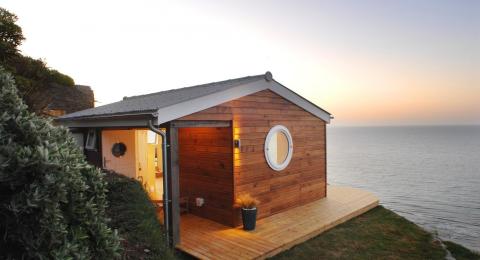The Green Real Estate minor at UNH integrates principles of eco-friendly design and energy conservation, preparing you for work in sustainable development initiatives. You will be well-prepared to drive innovation in real estate, advocating for greener building solutions and contributing to environmental sustainability in your professional career.
What is green real estate?
Property owners are becoming increasingly aware of the impact buildings have on the health of people, neighborhoods and the environment. This has affected the real estate market.Real estate now has a stronger focus on efficiency, sustainability and the local economy. Not only will you learn the fundamentals of real estate, but you’ll also study alternative energy, community and environmental planning, and current trends in green design. Combine this minor with a variety of majors to bring new perspectives to living, working and other spaces.
Why study green real estate at UNH?
Students in the green real estate minor do more than sit in a classroom. Through an interactive and dynamic curriculum,students develop a solid foundation in the basic principles of real estate and ever-evolving sustainability perspectives. Critical topics include energy, construction, green building design, finance and sustainability. Historically, the foundational course has been accredited by the NH Real Estate Commission as the required pre-licensing class. Students have gone on to work for land trusts, large corporations, planning offices and real estate brokerages.
Potential career areas
- Architecture
- Community and economic development
- Environmental planning
- Government planning
- Green construction
- Landscape architecture
- Materials engineering
- Public policy
- Real estate
- Regional planning
- Sustainable business
- Sustainable living
- Urban planning
Curriculum & Requirements
The green real estate minor will include the basic fundamentals of real estate (a class which is accredited by the New Hampshire Real Estate Commission). Students will learn about local and regional planning, environmental economics and market forces, and environmental issues as they pertain to real estate. In addition, students may choose complementary classes, such as architecture, surveying, land design, soils, wetland delineation, law, etc.
Academic policies related to Minors.
The minor consists of completing five courses (18-20 credits), with a minimum grade of C- or better in each course, and maintain a 2.0 average or better.
| Code | Title | Credits |
|---|---|---|
| Required Courses | ||
| CEP 508 | Applied Community Development | 4 |
| CEP 672 | Fundamentals of Real Estate | 4 |
| CEP 673 | Green Real Estate | 4 |
| Electives | ||
| Select a minimum of 8 credits from the following: | 8 | |
CEE 404 | Surveying and Mapping | |
CEE 700 | Building Information Modeling | |
CEE 703 | Site Design and Project Development | |
CEE 705 | Introduction to Sustainable Engineering | |
CEE 706 | Environmental Life Cycle Assessment | |
CEE 719 | Green Building Design | |
CHBE 410 | Energy and Environment | |
NR 435 | Contemporary Conservation Issues and Environmental Awareness | |
NR 437 | Principles of Sustainability | |
NR 507 | Introduction to our Energy System and Sustainable Energy | |
NR 607 | Land Economics Perspectives: Uses, Policies, and Taxes | |
NR 608 | Economics of Sustainability | |
NR 753 & NR 754 | Critical Issues in Sustainability: Sustainability as an Abundance Paradigm and Critical Issues in Sustainability: Sense of Place | |
NR 756W | Rural and Regional Economic Development | |
NR 785 | Systems Thinking for Sustainable Solutions | |
NR 787 | Advanced Topics in Sustainable Energy | |
| Note: The following classes are restricted to Paul College majors only | ||
FIN 701 | Financial Policy | |
FIN 702 | Investments Analysis | |
FIN 608 | Real Estate Finance | |
MGT 720 | Topics in Management II | |
| Total Credits | 20 | |





